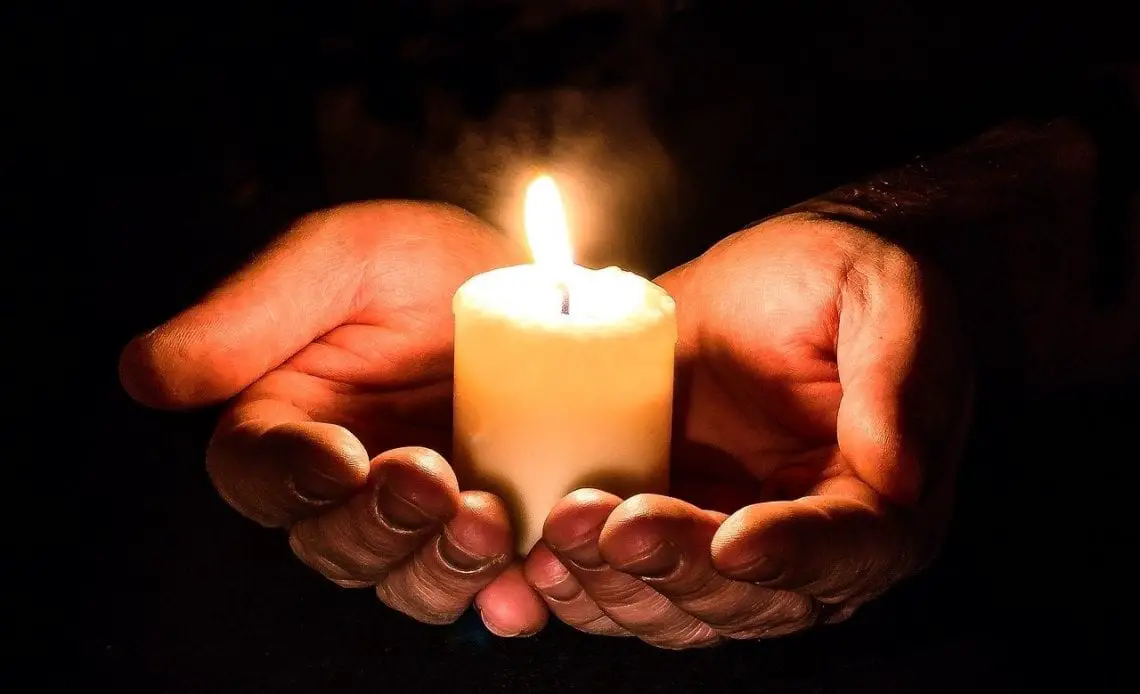
Faith and religion are not the same thing. While faith relates to personal experiences, religion is related to an organizational structure centered around a worshiping a divine being. Where both these concepts are similar, is in that they both relate to a relationship with the divine.
You don’t have to be religious to have faith. However, you do need to have faith if you’re religious.
What is the relationship between faith and religion?
Religion needs faith. It’s a concept that helps people come together to live spiritual lives. The faith they have in a divine being is what motivates them to lead lifestyles in tune with religious teachings.
But faith is a little more abstract. When you think about faith vs religion something thing that may not be immediately obvious is that religion is a man-made concept. Religious organizations were created by people as a way to disseminate divine teachings among the faithful. The rules written in the scriptures are written by people, and it’s also people that enact those same rules. Religion is a social structure that incorporates the use of faith.
Faith is itself an idea that is deeply personal to every person. It can emerge in your life at any time. At the same time, you may also feel as if your faith is being tested multiple times. Faith is essentially how deeply you believe in something. This belief system in the divine is what leads to people coming together under the umbrella of religion.
Can you be faithful without being religious?
Faith relates to trust, loyalty and hope. Even if you aren’t strictly religious, you can still have faith in the divine. Many people lead lives where they believe in a divine being, but don’t lead strictly religious lifestyles.
To put it simply, you don’t have to go to Church every Sunday to have faith. But if you’re religious, you are more likely to follow a religious lifestyle and go to Church every Sunday.
Can you be religious without having faith?
Without faith, religious expression isn’t possible. Religious organizations are deeply embedded in the belief that there is a divine consciousness that can enable people to lead better lives. Only people who believe in and have faith in such a divine entity are religious.
If you’re religious, then you already have faith. One of the biggest reasons behind why people leave religion behind in their lives, has to do with losing faith. Similarly, gaining this faith has also brought many people to religion.
A person who survived an accident they were sure they were going to die in might suddenly believe in a divine being. Such a person can then become religious. But a person who has lost faith, or someone who doesn’t have faith, can’t live the religious experience. This is as they don’t have the core belief system that is central to religious teachings – faith in God.
Why is faith and religion important?
Religion has the power to help people and elevate their lives. This is why it’s so important to people across the world. Religious organizations form an important part of the community and bring people together in social groups. Religion is also a historical tradition that has evolved and grown over the ages.
As an important and long lasting past of humanity’s history, religious institutions are a part of the humanity’s cultural history.
Faith has no strict definition, rules or regulations. Instead, faith is something that people experience daily. Faith isn’t strictly related to religion, even though religion is always related to faith. You can have faith in your family, faith in yourself, or faith in a divine being. To be religious, you must always have faith in a divine being.
But faith and religion have together brought many people together across the centuries. Faith vs religion is essentially that faith is a personal experience while religion is a community experience.
Faith, Religion, and Spirituality
If religion and faith are linked to each other, does spirituality have any association with faith? Absolutely.
Spirituality also entails the belief in a divine being. Both religion and spirituality accept that a divine being is watching over humanity, and that there is a divine plan for people. Faith and spirituality go hand in hand. For spiritual people, faith becomes even more important.
Those who walk the path of spiritual progress often look for signs that indicate they’re headed in the right direction. These signs and symbols can be repeating numbers, animals, dreams, and other experiences. They are deeply personal to each individual and relate to their lives.
But their important in that they reinforce the faith a spiritual person has for the path they are walking on. Faith vs religion vs spirituality only indicates that there are differences between these ideas. But they also need each other to flourish.
Faith VS Religion: What is the difference between a faithful person and a religious person?
Someone who has faith in God may not be actively religious. To be a religious person, you need to follow the regulations laid down by religious organisations. These rules differ depending on the religion you follow. The basic idea is to love good lives so you can lead a good afterlife.
A person who has faith may not feel the need to follow religious rules, and instead experience the divine in their own way. Spiritual people are an example of those who have faith but don’t follow religion, although some do both.
What are the main differences when it comes to faith vs religion?
Faith and religion manifest in the outside world as well. While they’re essentially personal experiences that elevate the human experience, they have left behind distinct marks in human history.
These marks also help to highlight the differences between faith vs religion. Take the case of religion and symbolism. Language and symbols have been an important part of religious organizations for decades. The use of the Cross in Christianity is an example of this. Faith by itself doesn’t have any symbols.
If you wear a necklace with a Christian cross, then this indicates that you have faith in the divine entity of Jesus Christ. However, while it expresses your religious affiliation, it doesn’t express where that faith came from or what it means to you.
There is no direct way to explain faith, except with the help of symbols that show an expression of that faith. Yet, you can easily express what religion you follow simply by wearing religious garb and participating in religious ceremonies.
Religion is also a social organization, while faith has no boundaries. To be a part of a religious institution, you must adhere to certain beliefs and customs. Faith has no rules and you can have faith in a divine being without being religious.
There is also the question of why you follow a certain religion. While in today’s world, you can change your religion later in life, many people are still born into certain religions. If you’re born into a Christian family, you may be raised as a Christian. If you’re born into an atheistic family, you may be raised to not believe in God. But in either case, you can still have faith. Faith is an experience that gives improves your life and gives you hope in something outside yourself.
Similar to how the family you were born into can have a say in the religion you follow, where you were born can also have a say. Certain countries practice certain religion more frequently than others. Some countries don’t follow religious practices as closely. Irrespective of where you’re born, the chances of you having hope and belief in something outside yourself in pretty high. This can manifest itself in many ways. For example, a person may not be religious, but they may still drop a quick prayer to God before an important job interview. A child whose worried about an exam their about to give, may also ask God to help them.
Finally, there is an important element to religion that doesn’t have a link to faith. This is the concept of legacy. The biggest religions today can trace their roots back in history. While there written and archaeological evidence when it relates to religion, the same can’t be said for faith. Yet it’s evident that faith and religion are important to each other. People who believe in God and follow religious practices are called ‘the faithful’, for example.
Faith vs religion is something people have debated about for many years. There is no strict consensus that definitively differentiates between these two ideas. However, that faith is an experience that people go through even if they aren’t religious has been seen. At the end of the day, faith is a personal experience, and religion is one way to show people that experience. If you want to express your belief and faith in God, then you can do so through religion. That makes faith and religion important to each other.
